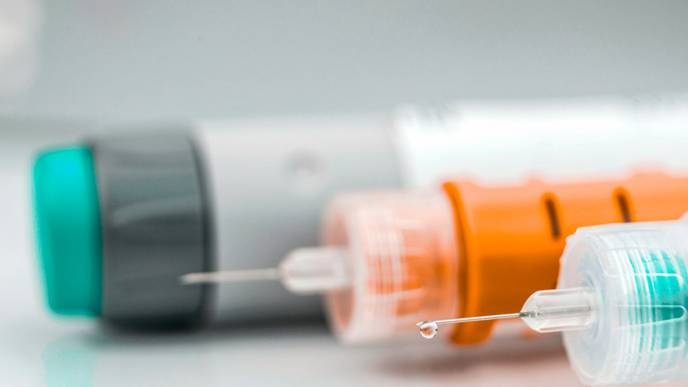ReachMD
Be part of the knowledge.™UAB Researchers Part of GRADE Study Investigating Glucose Medications in Type 2 Diabetes

UAB researchers say the presented data indicates that a younger age and higher HbA1c at baseline predict early treatment failure and point to the need for more aggressive initial treatment in these patients.
University of Alabama at BirminghamW. Timothy Garvey, M.D., and Andrea Cherrington, M.D. researchers recently presented NIH-funded findings regarding differences in medication acceptance, quality of life, insulin secretion, mortality and other outcomes among four commonly used Type 2 diabetes medications.
The Glycemia Reduction Approaches in Diabetes: A Comparative Effectiveness (GRADE) Study was conducted at 36 United States centers and nine subsites between 2013 and 2021. It was designed to compare four major medications approved by the FDA to treat diabetes in combination with metformin, the usual first-line drug. Major results focusing on the relative differences in blood glucose, or sugar, levels and the occurrence of cardiovascular outcomes, like heart attacks and stroke, were published in two papers in The New England Journal of Medicine in September 2022.
Ten scientific papers published in the April issue of Diabetes Care report other important differences between the four medications that are commonly used to treat Type 2 diabetes. The GRADE Study included more than 5,000 volunteer participants with Type 2 diabetes from diverse racial and ethnic groups. They were studied over five years, during which insulin glargine, liraglutide, glimepiride and sitagliptin were compared. The trial was funded by the National Institute of Diabetes and Digestive and Kidney Diseases, part of the National Institutes of Health.
Diabetes affects more than one in 10 — or more than 38 million — Americans. People with diabetes who keep their blood sugar levels in the near-normal range generally have a much lower risk of developing diabetes complications such as heart, kidney and eye diseases. The challenge is that most people with diabetes require more than one medication to control blood sugar levels over time.
Beyond the differences in blood sugar control between the four diabetes medications shown in the previous publications, the current findings examined individual characteristics that were associated with the achievement of lower and higher average blood sugar levels over time. For example, the inability to maintain good blood sugar control was largely driven by younger age and higher blood sugar levels at baseline. Understanding these factors can help to identify people who would benefit from more aggressive diabetes management. Another set of analyses revealed that adding liraglutide to metformin improved quality of life after the first year of treatment, but this benefit was subsequently lost. The improvement with liraglutide was related to the degree of weight loss, particularly in those who had the highest weight at baseline.
Andrea Cherrington, M.D., interim director of the Division of Preventive Medicine, and W. Timothy Garvey, M.D., professor in the Department of Nutrition Sciences and director of the NIH-funded UAB Diabetes Research Center, served as the co-principal investigators of GRADE at UAB.
“HbA1c continued to increase over time on all four diabetes medication treatment groups regardless of baseline characteristics,” Garvey said. “Therefore, we need better medications that can maintain diabetes control over longer periods and slow the progression to the need for insulin. While none of the interventions in the GRADE Study emphasized weight loss, the newer obesity medications, also under study at UAB, could be beneficial in this regard in the majority of patients with both diabetes and obesity.”
Of note, assignment to insulin therapy was well-accepted by the participants, with even better compliance than for the other medications, and there were no adverse effects of insulin therapy on the participants’ distress related to diabetes. In fact, treatment with insulin and the other injectable medication, liraglutide, lowered distress related to diabetes. These findings largely debunk the myth that patients are intolerant of insulin therapy or that once started it diminishes quality of life.
The sensitivity to insulin action and insulin secretion from the pancreas’s beta-cells are known to be important contributors to Type 2 diabetes. Their respective roles were reported in separate papers. The loss of insulin secretion was critically related to the progressive worsening of blood sugar control with all four medications, with reduced insulin sensitivity contributing to the outcomes of treatment.
The two most common causes of death during the study were cardiovascular disease and cancer, with no differences among the four treatment groups.
“GRADE has previously shown which medications worked best at achieving and maintaining blood glucose targets over time,” said GRADE Study Chair Dr. David M. Nathan, director of the Massachusetts General Hospital Diabetes Center. “The current findings provide additional information regarding the relative benefits and risks of the medications, which should help patients and their health care providers choose the best medication to treat their diabetes.”
The GRADE Study was supported by grant U01DK098246 from the NIDDK. Additional support was provided by the NIH’s National Heart, Lung, and Blood Institute, National Institute of General Medical Sciences, and National Center for Advancing Translational Sciences; the Centers for Disease Control and Prevention; and the American Diabetes Association. The Department of Veterans Affairs provided resources and facilities. Material support in the form of donated medications and supplies has been provided by Becton, Dickinson and Company, Bristol-Myers Squibb, Merck & Co., Inc., Novo Nordisk, Roche Diagnostics, and Sanofi. ClinicalTrials.gov number: NCT01794143.
Facebook Comments